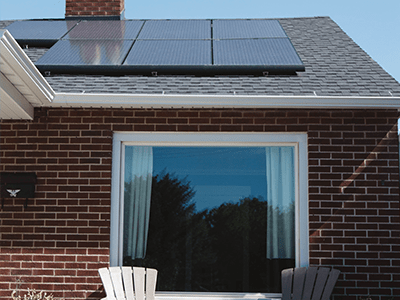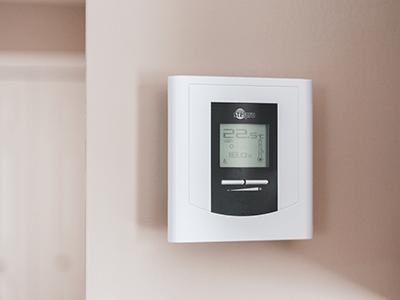
Fortunately, a little goes a long way, and making small changes to your everyday routine can have a massive impact in the long term. Here are some tips on how to go green at home:
Keeping your home at a comfortable temperature is one of the top contributors to emissions, so when it comes to the question of how to make your home eco-friendly, one great option is switching to a more efficient solution such as a heat pump.
Heat pumps work like reverse air conditioning units, taking small amounts of thermal energy from outdoors – even when it’s cold weather – and bringing it indoors. Modern heat pumps can take heat from various sources, with the ground being the most efficient and the air being the least, although air source heat pumps are still effective. Almost all types of heat pumps are more efficient than electrical heating and fossil-fuel burning systems, and they can be installed affordably.
Check out Access Self Storage Bristol – a clean, modern storage facility for local homes and businesses.
Reducing your use of heating – even by just a little bit – can have a big impact. A degree may not feel like much, but it decreases how hard your boiler is having to work. That’s not to mention the savings: dropping your house temperature by a degree will save you an average of £80 every year.
Even the most efficient heating is pointless if it’s escaping immediately, so it’s also important to seal your home effectively. The first place to check should be your heating and cooling ducts – you could be losing heat before it even gets to its destination!
If you’re looking for how to make your home eco-friendly, your next stop should be checking your windows, doors and walls for excessive heat loss. If you identify that a room isn’t retaining heat, insulation is one of the top pound for pound investments in improving your home’s efficiency.
Consider window glazing, weatherstripping, and wall insulation as long-term solutions – they’ll pay for themselves over time in terms of reduced heating costs. For cheaper, more immediate solutions, consider thermally lined curtains, thermal wallpaper, and draught excluders.
Access Self Storage Stevenage is a great way to securely store your stuff if you live or operate a business in Hertfordshire. Contact us today for a quote.
Technology comes to the rescue! Whereas an old-fashioned thermostat may only let you set the temperature at a fixed number or let you turn the heating on or off at certain times, modern alternatives provide a much greater degree of control.
Programmable thermostats, which are available at a range of price points, enable you to set the exact temperature at different times of day and ensure that your home is never too warm or too cold. This combines comfort and eco-friendly home design to ensure that you’re only using the heat when you need to, cutting down on waste. Some smart thermostats even have mobile apps so you can adjust the temperature right from your phone!

Energy use accounts for over a fifth of household emissions, so it needs to be a consideration in how to make your house eco-friendly. Choosing for low-power alternatives when shopping for household electronics such as office equipment or televisions is a great way to reduce your energy usage.
One of the easiest changes is to switch from old-fashioned bulbs to LEDs. Not only are they significantly more energy efficient, LEDs last longer and produce less waste. These modern alternative bulbs have dropped significantly in price since they were first introduced, so you can probably change the lights across your entire home at very little added cost.
Appliances are famously energy hungry, so it’s especially important to seek out more efficient options when shopping for them. Fortunately, many appliances are required by law to provide a colour-coded energy label and letter grade so you can tell exactly how efficient it is compared to other appliances in its class.
Check out Access Self Storage Coventry for cheap modern storage in the West Midlands.
Appliance maintenance may not be the first thing that comes to mind when you consider how to make your home eco-friendly, but keeping your washing machine, dishwasher, refrigerator, and other appliances in good shape is surprisingly important. Most appliances use a significant amount of energy, so cutting down on waste here can make a bigger difference than it would on more efficient electronic devices.
Start by regularly defrosting your fridge – most manufacturers recommend every six months – so the cooling elements have an easy time keeping the contents cold. Next, find standby options on your washing machine and dish washer and turn them off, especially if they’re from before 2013 when the EU implemented limits on standby power usage.
Do you know which regions are the best and worst at recycling in the UK? You can find out by looking at our recycling data.
A washing machine uses about as much power to clean a half load of laundry as it does a full one, so an eco-friendly home should only ever do a load of wash when the machine is full. The same goes for dishwashers.
It’s also worth looking at the settings on your machine and considering whether the energy expense is worthwhile. For instance, are you really getting additional value from washing your clothes at 30°C rather than 20? Many Appliances also offer “eco” modes, but it’s worth doing a little research to find out what they actually do rather than assuming they’ll make a big difference.
Looking for self storage in Birmingham? Check out Access Self Storage Birmingham Central and Access Self Storage Erdington.
As part of a nationwide effort to make the UK more eco-friendly, the government has launched the Green Deal, a programme designed to support people as they create their dream eco-friendly home. Check out the government’s Green Deal website to find out what the most cost effective and environmentally impactful changes for your home would be, spread the cost over ten or more years, and get connected with a certified installer.
That’s it for tips on how to make your home eco-friendly, but check out our other blogs on eco-friendly restaurants in London and how to recycle clothes.
If you’re interested in self storage, use our store search to find your nearest facility.